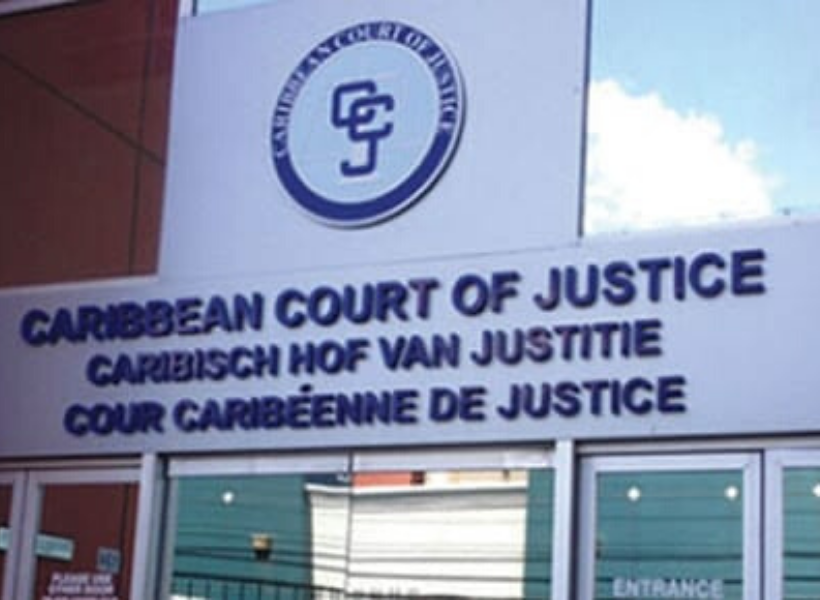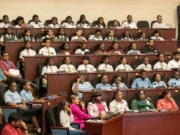By Feona Morrison
Yesterday, the Caribbean Court of Justice (CCJ), Guyana’s final court of appeal issued an order restraining the Guyana Elections Commission (GECOM ) from making a declaration of the results of the March 02, 2020 elections.

The order is to the effect, “The Guyana Elections Commission and its officers and agents take no step to prejudice the fair hearing of this application including but not limited to issuing a declaration of the results of the elections held on 2nd March 2020, until this Court issues final orders following the hearing and determination of the questions raised before this Honourable Court in the said application.”
The application has to do with a case filed by PPP/C Presidential Candidate Irfaan Ali, and its General Secretary Bharrat Jagdeo, to the CCJ for Special Leave to appeal against a majority ruling of the Court of Appeal which held it had jurisdiction to hear a case filed by “APNU Proxy”, and Georgetown resident, Eslyn David who sought to block the declaration of a winner of the elections.
David’s case was premised on Article 177 (4) of the Constitution and argued that GECOM failed to arrive at a final credible count under the terms of the Order No. 60 of 2020, and the amended order dated May 29, 2020, which governs the Recount of all ballots cast in General and Regional elections.
The Court of Appeal ruled that pursuant to Article 177 (4) of the Constitution it had jurisdiction to hear the case, in so far, as to grant an Order sought by David for the words “more votes cast” contained in Article 177 (2) (b) of the Constitution to be interpreted to mean “more valid votes cast” in terms of Order No. 60 of 2020, and that GECOM was obliged under this Order to determine whether the final count was credible.
Among other things, Ali and Jagdeo are contending that the Court of Appeal fell into grave constitutional error in its ruling, and was plainly wrong on several grounds; they have moved to the CCJ to have the decision overturned.
Government’s Chief Legal Advisor, Attorney General Basil Williams, is however of the firm conviction that PPP/C’s case has no prospects of success, and must fail, as the CCJ has no jurisdiction to entertain the party’s application.
In a media release, Williams said that pursuant to Article 177 (4) of the Constitution, the CCJ is not conferred with authority to hear the matter.
According to Article 177 (4): The Court of Appeal shall have exclusive jurisdiction to hear and determine any question as to the validity of an election of a President in so far as that question depends upon the qualification of any person for election or the interpretation of this Constitution; and any decision of that Court under this paragraph shall be final.
While the CCJ is Guyana’s apex Court, Williams pointed out that the Caribbean Court of Justice Act Cap 3:07 limits the appellate jurisdiction of the Court.
Section 4 of the Caribbean Court of Justice Act states as follows: 4. (1) The Court shall have – ( a) original jurisdiction; (b) appellate jurisdiction provided for in this Act as is conferred on it in accordance with the provisions of Part III of the Agreement; (3) Nothing in this Act shall confer jurisdiction on the Court to hear matters in relation to any decision of the Court of Appeal which at the time of entry into force of this Act was declared to be final by any law.
The Attorney General reminded that the Caribbean Court of Justice Act came into force in 2004. At this time, he pointed out that Article 177 ( 4) of the Constitution was already part of the laws of Guyana. He said, “It made the decisions of the Court of Appeal final in respect of matters determined thereunder [Article 177 (4)] and expressly ousted the jurisdiction of any higher appellate court.”
Williams added that on a plain reading of Article 177 ( 4) of the Constitution and Section 4 of the Caribbean Court of Justice Act, no appeal shall lie to the CCJ in respect of matters determined by the Court of Appeal under Article 177(4). This conclusion in no way conflicts with the powers conferred upon the CCJ under the Agreement establishing the Caribbean Court of Justice, Williams, a Senior Counsel added.
“Part III of the Agreement establishing the Caribbean Court of Justice recognizes that the CCJ has such jurisdiction and powers as are conferred on it by this Agreement or by the Constitution or any other law of a Contracting Party.”
He pointed to ARTICLE XXV (1) of the Caribbean Court of Justice Act which states: In the exercise of its appellate jurisdiction, the Court is a superior Court of record with such jurisdiction and powers as are conferred on it by this Agreement or by the Constitution or any other law of a Contracting Party.
According to him, this Article recognizes the jurisdiction of the CCJ as being derived from three sources-the Agreement, the Constitution or any other law of a Contracting Party. He further said that the issue of priority therefore arises where the jurisdiction and powers conferred under the Agreement conflict with that which is conferred by the Constitution or any other law of a Contracting Party.
But this issue, he noted, is resolved in ARTICLE XXV (5) of the Caribbean Court of Justice Act, which gives precedence to the local law. It states: Nothing in this Article shall apply to matters in relation to which the decision of the Court of Appeal of a Contracting Party is, at the time of the entry into force of the Agreement pursuant to the Constitution or any other law of that Party, declared to be final.
“Therefore where the effect of the provisions of the Constitution or the local law is to oust the jurisdiction of the Court, even where there is conflict with the Agreement, regard must be given to such local law. The Constitution is, after all, the supreme law of the land (Article 8 of the Constitution of Guyana) and nowhere in the Constitution exits a provision that mandates that the CCJ is to exercise appellate jurisdiction in respect of all matters determined by the Court of Appeal,” Williams explained.
The Attorney General concluded that while the CCJ accepts its position as a superior court of record, it has continuously recognized that it only possesses such jurisdiction and powers as are conferred on it by the Agreement or by the Constitution or any other law of the Contracting Party.
In this regard, he noted that the CCJ does not usurp the jurisdiction reserved, by the laws of that Contracting Party, for the Court of Appeal of the Contracting party, and referred to the ruling by the very CCJ in the case of lnternational Environments Ltd v AG et al.
The judgment in the case is attached here: https://ccj.org/wp-content/uploads/2019/11/2019-CCJ-18-AJ.pdf
In light of the foregoing, the Attorney General submitted that an appeal cannot lie to the CCJ in respect of matters determined under Article 177( 4) of the Constitution.
Meanwhile, the CCJ in an order issued yesterday, announced that a Case Management Conference will be held tomorrow, Thursday, June 25, 2020 at 3:00 pm via video conference with a view to a proposed hearing, to determine issues raised in the application on Wednesday, July 01, 2020 at 10:00 am via video conference.













